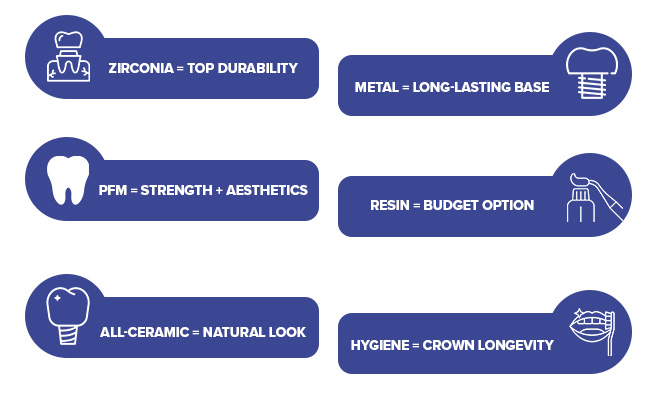Dental Crown Types and Cost in India – A Comprehensive Guide

Cracked, decayed, or worn-down teeth can affect more than your smile/ They can impact your oral health and daily comfort. That’s where dental crowns step in. Designed to restore strength, function, and appearance, crowns are a go-to solution in modern dentistry.
But what type of dental crown should you choose? And more importantly, how much does it cost in India?
Let’s walk through everything you need to know, including zirconia crown price, materials, durability, and best practices—so you can make an informed decision that suits your dental and financial needs.
What is a Dental Crown?
A dental crown is a custom-made “cap” that encases a damaged or decayed tooth. It helps restore the tooth’s original shape, strength, and appearance.
When Do You Need a Crown?
You may need a crown in the following cases:
- After a root canal treatment
- Severely decayed or broken teeth
- Cosmetic enhancement
- Supporting a dental bridge
- Covering a dental implant
Crowns offer a protective shield, helping maintain the structure of your tooth while enhancing its appearance.
Why Are Dental Crowns Important?
- Reinforce weak or broken teeth
- Cover dental implants
- Improve tooth aesthetics
- Anchor dental bridges
- Prevent further decay or wear
They also restore chewing function and overall dental alignment, making them essential for long-term oral health.

Types of Dental Crowns Available and Their Prices in India
Choosing the right crown depends on your budget, functional needs, and cosmetic expectations. Here’s a breakdown of the common options:
1. Zirconia Crowns
Zirconia crowns are the premium choice—durable, metal-free, and translucent like natural teeth.
Pros:
- Biocompatible and safe for long-term use
- Aesthetic appearance
- High fracture resistance
Ideal For: Front and back teeth, patients with metal allergies
Zirconia Crown Price: ₹15,000 to ₹25,000 per crown
Zirconia is a top choice for individuals seeking a natural look without compromising durability. These crowns are milled using computer-aided technology, ensuring precision and longevity.
2. Porcelain-Fused-to-Metal (PFM) Crowns
These combine strength with aesthetics, thanks to a metal base and porcelain coating.
Pros:
- Durable and strong
- Matches tooth color
Cons:
- Possible gum discoloration
- Porcelain may chip over time
Cost: ₹10,000 to ₹30,000 per crown
PFM crowns are widely used due to their balance of strength and appearance. However, they might show a dark line near the gum over time.
3. Full Porcelain Crowns
Made entirely of ceramic or porcelain, these offer superior aesthetics.
Pros:
- Highly aesthetic
- No metal content
Cons:
- Not ideal for molars or high-bite-pressure areas
Cost: ₹10,000 to ₹30,000 per crown
These crowns are most commonly used in front teeth restorations due to their superior light reflection properties.
4. Metal Crowns
Crafted from gold, nickel, or chromium alloys, these are exceptionally strong.
Pros:
- Durable
- Less tooth removal required
Cons:
- Noticeable metallic color
Cost: ₹5,000 to ₹15,000 per crown
Though not preferred for visible areas, metal crowns are ideal for molars due to their durability and longevity.
5. Composite Resin Crowns
Affordable and easy to work with but less durable than other materials.
Pros:
- Budget-friendly
Cons:
- Wears down quickly
- Prone to staining
Cost: ₹5,000 to ₹10,000 per crown
These are typically used as temporary crowns or for low-stress areas due to their limited durability.
What Influences the Tooth Crown Cost in India?
Several factors affect the tooth crown cost in India, including:
- Material Used: Zirconia, porcelain, and metal differ in pricing.
- Dentist’s Experience: Highly skilled professionals may charge more.
- Location: Urban areas like Chennai may see varied pricing.
- Technology & Lab Work: Digitally designed crowns are more precise and may be priced higher.
- Complexity of Procedure: Additional treatments like post-and-core buildup may increase cost.
Which Dental Crown Should You Choose – A Quick Comparision
| Crown Type | Durability | Aesthetic | Average Cost (INR) |
|---|---|---|---|
| Zirconia | High | Excellent | 15,000 – 25,000 |
| PFM | Medium | Good | 10,000 – 30,000 |
| All – Ceramic | Medium | Excellent | 10,000 – 30,000 |
| Metal | High | Poor | 5,000 – 15,000 |
| Resin | Low | Fair | 5,000 – 10,000 |
Tip: Always consult your dentist in Chennai to match the crown type with your clinical needs and budget.
Understanding the Zirconia Crown Cost in India
Zirconia crowns are gaining popularity for being long-lasting and aesthetically pleasing. But why do they cost more?
- Advanced Technology: CAD/CAM fabrication ensures a precise fit.
- Biocompatibility: Lower risk of allergies or gum irritation
- Superior Strength: Suitable for both front and back teeth
- Long-Term Investment: Fewer replacements mean better long-term value
Zirconia crown cost reflects both material and technology advantages.
Best Practices When Opting for Dental Crowns
Here are a few points to ensure a smooth crown journey:
- Ask for Warranty: Some clinics offer 5–15 year warranties on crowns
- Maintain Oral Hygiene: Brush, floss, and rinse regularly
- Avoid Hard Foods: Especially during the first few weeks
- Routine Dental Visits: Schedule regular follow-ups with your dental clinic in Chennai
- Don’t Delay Replacement: Ignoring worn or cracked crowns can lead to bigger issues
- Follow Aftercare Instructions: Always adhere to your dentist’s post-procedure advice
It’s All About the Right Choice!
Choosing the right dental crown is a balance of aesthetics, strength, and budget. Whether you’re considering a simple metal crown or exploring the high-performance benefits of zirconia, knowing the tooth crown cost in India helps you plan better.
Weigh your options with professional guidance and invest in quality for long-term benefits. If you’re in search of a trusted dentist in Chennai, Radiant Dental Care provides tailored dental solutions backed by experience, advanced technology, and patient-first care. Reach out today to explore the best crown option for your smile.
Frequently Asked Questions:
What is the most durable type of dental crown available in India?
Ans. Among all the available options, zirconia crowns are known for their exceptional durability and strength. They are made using advanced CAD/CAM technology and can withstand high bite pressure, making them suitable for both front and back teeth. Their fracture resistance and biocompatibility also contribute to their long-lasting performance.
Is the process of getting a dental crown painful?
Ans. No, the procedure for placing a dental crown is typically painless. Dentists administer local anesthesia to numb the area during tooth preparation. While some mild discomfort or sensitivity may be experienced after the procedure, especially when eating or drinking hot or cold items, it usually subsides within a few days.
How do I take care of my dental crown to ensure it lasts longer?
Ans. To extend the lifespan of your dental crown, maintain a proper oral hygiene routine—brush twice daily with a soft-bristled toothbrush, floss gently around the crown area, and use an antibacterial mouthwash. Avoid chewing on hard substances like ice, nuts, or pens, and schedule regular check-ups with your dentist in Chennai to monitor the crown and surrounding gum health.
Can dental crowns look and feel like natural teeth?
Ans. Yes, especially when you opt for zirconia or all-ceramic crowns. These materials are designed to closely mimic the translucency and texture of natural enamel. When properly shaped and color-matched by a skilled dentist, they blend seamlessly with your existing teeth and are virtually indistinguishable from natural ones in both appearance and function.
Are dental crowns suitable for children or younger patients?
Ans. In some cases, children with severe tooth decay or developmental issues may require crowns. Pediatric dentists often use stainless steel or resin crowns for primary teeth to preserve tooth structure and prevent further damage. However, the choice of material and need for crowns depends on the child’s dental condition and overall treatment plan.

 +91 9513446186
+91 9513446186
